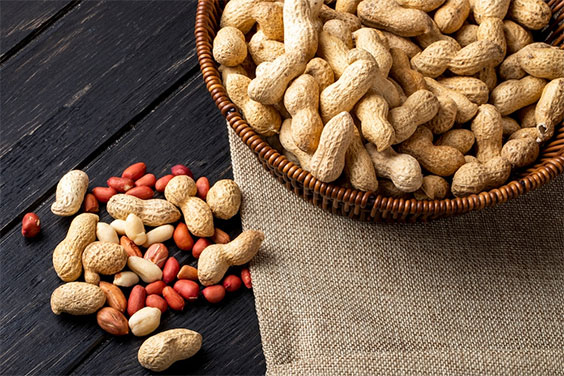
Whether they’re crushed into butter, eaten right out of the shell, or sprinkled over a salad, peanuts are a popular snack. You could say, it is one of best examples of healthy snacking. According to a recent survey of 2,000 adults by market research firm Mintel, 64 percent said they’d eaten peanuts within the past three months. That’s more than those who said they’d eaten almonds, cashews, pistachios, or trail mix.
Peanuts have about the same amount of calories as almonds, cashews, and walnuts, but they win when it comes to protein (with 7 grams per ounce, they have nearly twice as much as walnuts, for example), and are second only to almonds in terms of fiber (2.4 grams vs. 3 grams per ounce).
Walnuts are rich in heart-healthy omega-3 fatty acids, but peanuts stand out for their arginine content. This amino acid (a building block of protein) helps to improve blood flow by relaxing constricted blood vessels.
Whether you’re looking for nutritious or delicious, peanuts and natural peanut butter make great snack choices. Here are four compelling reasons why:
Peanuts help you feel fuller for longer
They’re a good source of fiber, which helps keep hunger pangs at bay. When eaten in small amounts in place of less nutritious snacks, peanuts, and peanut butter may be beneficial for weight control in both children and adults.
One study funded by the U.S. Department of Agriculture (USDA) involved a group of overweight students participating in a weight-loss program focused on nutrition education and physical activity. Every afternoon, they were offered peanut or peanut butter snacks. After six months, kids who ate the peanutty snacks at least twice a week lost more body fat than those who ate the snacks less often.
Peanuts are little bundles of nutrition
Sometimes, it’s good to be dense. The USDA’s Dietary Guidelines for Americans recommends choosing more nutrient-dense foods, which provide:
- Vitamins, minerals, fiber, and other health-promoting substances
- Little or no unhealthy fats, added sugars, refined starches, and sodium
Peanuts fit that definition to a tee. Among other nutrients, they contain folate, niacin, thiamin, vitamin E, copper, magnesium, and phosphorus. Plus, they provide protein, fiber, and monounsaturated fat—the same kind of heart-healthy fat found in olive oil and avocados. That’s a lot of goodness packed into every bite.
Peanuts are great for grab-and-go eating
Whether you’re looking for a snack to enjoy at your desk, in the park, or on a travel break, peanuts are a no-muss, no-fuss solution. Spreading peanut butter on apple slices, celery sticks, or crackers takes only an extra minute.
The fiber and protein in peanuts also give you a sustained energy boost, so they’re a favourite ingredient in trail mix. Combined with other nutritious ingredients—such as dried cranberries, raisins, and whole-grain cereal—they’re a classic snack for on-the-go adventures.
Peanuts make your taste buds happy
People are becoming more interested in healthy, nutritious snacking. Still, the number one reason many of us snack is to treat ourselves, according to the Mintel survey. Peanut and peanut butter taste like an indulgence but act like a healthy bite. That’s a marriage of flavour and function that can’t be beaten.
References
https://www.mintel.com/press-centre/food-and-drink/top-reason-us-consumers-snack-is-to-treat-themselves
https://www.ncbi.nlm.nih.gov/pmc/articles/PMC4711439/
https://health.gov/sites/default/files/2019-09/2015-2020_Dietary_Guidelines.pdf
